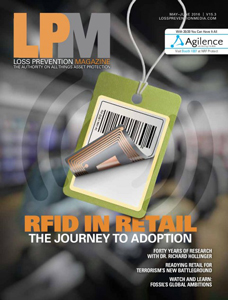(This article originally appeared in Loss Prevention Magazine)

What and Who
Hiring new people is always tricky, balancing their current qualifications versus the current requirements of today and the evolving challenges of tomorrow. Consider this—a loss prevention associate starts his career looking for shoplifters physically taking items out of the store. Then the job evolves into detecting associates trying to pull one over on the point-of-sale system and then detecting fraud from an organized retail crime ring. With the more ways we as LP professionals try to prevent and detect crime, criminals evolve their behavior to defeat it.
In the era of ever-evolving technology, the world of loss prevention needs to keep up. While marketing departments are using machine-learning algorithms to determine whether or not to send an individual customer a flyer advertising shoes, loss prevention is toiling in Excel putting together bar charts for high-shrink departments. Not that the information isn’t useful—it’s an illustration of how far LP has come and how far it still needs to go to be a thriving part of the business.
With the Future of LP Working Group, we asked LP professionals and store managers to consider what are important characteristics of an LP associate today and what those skill sets will look like down the road. The survey captured the feedback of nearly 200 respondents.
Focusing on the Now
Starting with the top-rated characteristics for current loss prevention associates, qualities that require engaging with others and having a good head on their shoulders rank higher over other skills. The social aspect of the LP associate, as well as being able to communicate the impact of an investigation to the store and company, take precedence over more technical or analytic qualities. Additionally, knowledge of physical systems through experience is a desired skill for current LP associates. Many respondents noted that the current LP associate really has to leverage the current technology to its fullest as many companies do not have the time budget allocation to experiment with new technologies that are not yet “tried and true.”
These are all very traditional skills for LP and even law enforcement. These are mainly soft skills that encourage cooperation between store staff and LP. The ability to make solid business decisions also encourages a certain amount of autonomy in the choices an LP associate makes. This makes sense because a lot of their decisions to investigate or detain an individual typically have to happen in a short period of time. Otherwise, they may lose the opportunity to make an apprehension.
Looking Ahead
With greater interconnectivity of technology, it appears that the loss prevention associate can no longer rely solely on good investigative skills and intuition; however, those characteristics will remain as a backbone for them in the future. With the availability of data and the various ways it can be looked at, the future LP associate should be looking to detect certain crimes before they happen or conduct their surveillance more in line with the “hot spot” policing tactics employed by law enforcement.
When looking to the future, many of the characteristics for current associates are still important but need to take a more evidence- and logic-based approach to new problems. As data becomes more available to AP professionals, the field will have to become more accustomed to looking at its own information and drawing conclusions from it. Problem-solving and analytical skills will likely dictate how an AP associate spends time investigating. Having a background in Excel and being able to visualize data will allow the AP associate to quickly identify problematic departments, as opposed to having them wait to receive data analysis results from a centralized portion of your organization. As I’ve mentioned in previous articles, it’s easier to teach a data person LP than it is to teach data analysis to an LP person.
Being a good business partner is integral to any company’s success. Many of us are still relying on employee training that is dated and doesn’t consider how the retail landscape has changed over the years. Even here, we still have AP training videos where the people look like they just came from a filming of Saved by the Bell. Studies have been conducted regarding the impact of different training methods on differing age levels and found that there is no one-size-fits-all-ages training.
It’s important to keep this in mind because if we are expecting future LP associates to adapt their skill set to a changing environment, we’d better be doing our part to make sure the training is in line with our future expectations.
Remember—we’d love to get you and your organization in the LPRC and working with us. Discussing what the future LP associate and key pieces of training they will need is just one of many issues we’re working together on in the Loss Prevention Research Council’s Future of LP Working Group.


